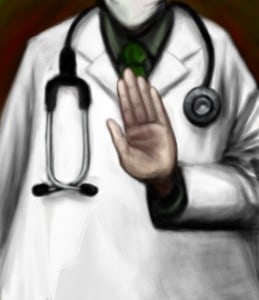
Medicare Study Reveals Rampant Underreporting of Medical Errors
Our New York City medical malpractice law firm earnestly believes that most doctors and medical facilities wish to bring quality health care to their patients. Young people
Home » Patient Safety Blog » “Emotional Distress” Claims in Medical Malpractice Cases
Contrary to public perception, the law is not made up of a static set of rules.
Instead, as society changes and community values evolve, legal rules and principles are expanded, altered, and molded by the judicial system in an effort to reflect the things that we as a society deem just.

As a New York City Medical Malpractice and Patient Safety Rule lawyer, I appreciate that our state has often been at the forefront of new legal trends.
In fact, legal decisions here often influence legal doctrine developments in other states.
For example, as reported last week in Medical Daily, the Supreme Court of Pennsylvania ruled last month that an obstetrician can be sued for a patient’s “emotional distress” even if there is a lack of evidence to show any “physical” harm to the patient.
Developments in New York law along these same lines were cited by the Pennsylvania State Court in its opinion.
Psychological injuries, called “emotional distress” are the cognitive equivalent of physical injuries.
I personally feel that allowing emotional distress claims without physical harm is important because it provides redress in situations where doctors act inappropriately but might otherwise escape accountability.
A recent case from Pennsylvania is an example of the need for expanded recognition of emotional distress claims by the courts.
The case from Pennsylvania involved a woman who sued her obstetrician because he failed to prepare her for the mental shock or “emotional distress” she suffered as a result of discovering her newborn son’s deformities at the moment he was delivered from her body.
By way of background, the defendant doctor had performed an ultrasound on Ms. Toney while she was pregnant.
He told her the unborn child was “healthy and normal”.
Unfortunately, that was far from true.
When the little boy was born he had:
In addition, the child had:
The tragedy of her newborn son’s condition and the shock she endured after having been told for the preceding 9 months to expect a healthy child understandably caused Ms. Toney severe emotional distress.
According to documents filed with the court which initiated the suit, the plaintiff stated that the situation caused her sleeplessness, nightmares, rage, nausea, hysteria, grief, and anxiety.
The doctor and hospital tried to dismiss her case on a technicality by claiming that they could not be held liable for the mother’s emotional harms since the courts in Pennsylvania have not previously recognize “emotional distress” as a valid cause of action.
However, the State’s highest court disagreed and allowed the claim to move forward.
In doing so, the court specifically noted:
“It cannot be rationally argued that the defendants did not owe a duty of care directly to [the mother]. It is also entirely foreseeable that under the circumstances as alleged, [the mother] would suffer traumatic emotional distress during the birth of her son.”
The court found that the elements of negligence and foreseeability were adequately pled by the plaintiff.
The court limited this kind of recovery for cases with a special relationship where it is foreseeable that the breach of duty would result in emotional distress so extreme that a reasonable person should not be expected to endure it.
This case is part of a nationwide trend to allow for more relaxed standards in suing for emotional distress without a concomitant physical injury.
The Pennsylvania court cited a New York Appellate Division case from 11 years ago, Perry-Rogers v. Obasaju, which ruled that a couple could sue a fertility clinic for emotional distress after they implanted another woman with the plaintiff’s embryo, regardless of the fact that neither woman suffered physical injuries.
The Appellate Division held that the couple had suffered substantial emotional injury due to the clinic’s breach of their duty of care.
As an attorney who practices here in New York, I am pleased to know that more courts have followed this trend of allowing severely distressed patients to recover for their valid and sometimes crippling emotional injuries.
This logical legal rule ensures that doctors and hospitals in a position to prevent these emotional harms will have incentives to do so.
Again, by making things safer for individual plaintiffs, courts and juries are continuing to re-enforce the message to doctors and hospitals that they must either follow the safety rules, or pay for the consequences of their malpractice.
Currently in New York, there is only limited recovery for emotional distress.
For example, a widow or orphaned child may not sue for emotional distress for the loss of a spouse or parent.
However, a mother is allowed to sue for her “emotional distress” that results from delivering a “stillborn” baby that was killed as a result of malpractice while still in utero or during the birthing process.
[See, Broadnax v. Gonzalez, 2 N.Y.2d 148, 777 N.Y.S.2d 416 (2004).]
However, the Court has made clear that a mother may only sue for emotional distress where her child is actually “dead” at the time of delivery.
[See, Sheppard-Mobley v. King, 4 N.Y.2d 627, 797 N.Y.S.2d 403 (2005).]
Therefore, even if a child is born severely impaired and dies a short time later, as long as the child shows some level of “consciousness” after birth, the mother may not sue for emotional distress in New York.
So, ironically, if the Toney child from Pennsylvania was born here in New York, the mother would not be permitted to assert a claim for her “emotional distress” under current New York case law.
Do you think New York should loosen the restrictions on claims for emotional distress and, for example, allow a grieving spouse to assert a claim for her/his emotional distress?
Should more States allow patients to file a lawsuit for “emotional” injuries where there are no “physical” injuries?
Here, at The DiPietro Law Firm, we’re committed to helping victims of sexual abuse and assault find the justice they deserve.
All information discussed during our consultations always remains completely 100% confidential.
Would you like our help?
Founder Anthony T. DiPietro, Esq. is a compassionate and skilled trial attorney who has completely dedicated the past 23 years of his career to litigating medical malpractice and sexual abuse cases against major corporate institutions including hospitals, medical clinics, schools, and other wrongdoers.
Mr. DiPietro has also obtained some of New York State’s highest verdicts and settlements, and has been selected to New York State Super Lawyers® each year, for the past 10 years in a row.
In 2022, Mr. DiPietro was selected as one of America’s Top 100 High-Stakes Litigators for the landmark cases he’s won on behalf of survivors of sexual exploitation and abuse.
Here, at The DiPietro Law Firm, we’re committed to helping victims of sexual abuse and assault find the justice they deserve.
All information discussed during our consultations always remains completely 100% confidential.
Would you like our help?

Our New York City medical malpractice law firm earnestly believes that most doctors and medical facilities wish to bring quality health care to their patients. Young people

A lot of attention was paid in 2011 to the dangers of driving while distracted. Media reports and safety campaigns have encouraged drivers to put
Years of Abuse: 1987 – 2016
Brief:
Robert Hadden, a disgraced Obstetrician-Gynecologist (OB/GYN) who worked for Columbia University and NewYork-Presbyterian Hospital, was criminally convicted in 2016 of sexually exploiting and abusing patients under the guise of medical care.
Hadden used his position of authority and trust to sexually exploit women and girls for nearly three decades as a Columbia University physician.
All the while, Columbia University and New York-Presbyterian Hospital administrators turned their backs and ignored reports of Hadden’s abuse, gaslighting patients and the public.
Read More:
Years of Abuse: 1979 – 2022
Brief:
David H. Broadbent is a former OB/GYN under criminal investigation and facing civil lawsuits for sexual abuse of patients.
Broadent worked at multiple medical facilities in the Provo, Orem and Salt Lake City, UT areas.
These facilities included Intermountain Healthcare’s Utah Valley Hospital, MountainStar Healthcare’s Timpanogos Hospital, other Utah health care providers, and he also had adverse action taken against his medical license back in 1990.
Read More:
Years of Abuse: 1990 – 2016
Read More: University of Southern California & Predator George Tyndall
Years of Abuse: 1961 – 1996
Brief:
22 predator teachers and administrators, over the course of 35 years.
Years of Abuse: 1960 – 1982
If you have any questions about whether or not you have a case, or just want to obtain more information about what you’ve experienced – feel free to contact us through our secure website chat.
You can also contact us by calling us at (212) 233-3600 or toll free at (800) 215-1003.
All of our consultations are free and 100% confidential. Thank you.
All Rights Reserved ©2023 by The DiPietro Law Firm